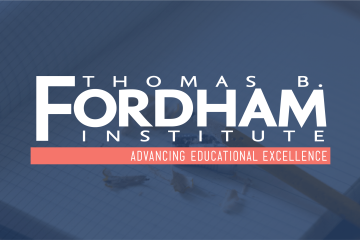- God bless all the folks in Dayton who are taking Fordham and NCTQ’s new report on the quality of teacher prep programs seriously (and thanks a million for the thoughtful media coverage). I’m sure this is largely because both the University of Dayton and Dayton City Schools come out looking very good in this area. (Also would explain why Miami University folks are “currently unavailable for comment” thereupon.) Folks in Youngstown should probably crack the spine of this bad boy also, if you ask me. They could use the modicum of good news it provides. (Dayton Daily News, 5/24/23) Tom Gunlock is a resident of the Dayton area; currently chair of the Wright State University board and former member of the state Board of Education. While he doesn’t mention Fordham and NCTQ’s report in his recent DDN op-ed, he is clearly determined that better reading instruction—including a robust Third Grade Reading Guarantee, the best teacher prep, and a singular focus on the science of reading—is key for Ohio to become an education leader. (Dayton Daily News, 5/23/23)
- So, Ohio’s Auditor of State has sent out a survey to school districts asking them to report how much state money they have given to the voucher grouchers’ lawyers in order to sue the state to challenge and, hopefully, eliminate the state’s EdChoice Scholarship Program. (Ooh. Twisty!) The grouchers have, on the order of those attorneys (“That’ll be $5,000.”), advised school districts not to answer the survey on grounds of…whatever the heck they have laid down as a reason to oppose it. (Honestly, I couldn’t concentrate on the piece due to the whining coming off it in waves and the sound of lawyers’ cash registers’ cha-chinging loudly in the background.) Now, I am not for a minute implying that I know better than all of these august folks, but a) seeing as how all of the elected school boards had to vote on joining the lawsuit or not, and b) that elected school board votes are public records, and c) the grouchers pretty much crowed about every single elected school board who did vote to join up, and d) that the “cost” to join up was a certain amount per pupil (may be a single number, may be different per district based on available state funding), and e) that per pupil amount is probably in the public record or could be extrapolated from publicly available data, it seems to me that i) this whole fill out the survey/don’t fill out the survey business is going to end up moot—minus the lawyers’ fees, and ii) the information will be readily available for AOS and/or anyone else who might want to go to the trouble of searching it out. Just sayin’. (Columbus Dispatch, 5/23/23)
- Speaking of school funding (were we?), the constitutional scholars on the Vindy.com ed board have a thought thereto. (Vindy.com, 5/23/23)
- I’m sure the omission is due to space or time considerations, but we are promised in both headline and subhead that the elected school board of Warren Local Schools received info about student reading score improvements at their recent meeting. No such detail is provided in the piece, as I said, likely due to space limitations in the paper or an early deadline for the reporter. What information do we get? Well, it seems that the district’s treasurer spends a lot of time watching TV news coverage of debt ceiling drama in Washington for no discernable reason and also that she is confident her district is not headed for a post-ESSER fiscal cliff (“This district is not in that position at all.”). Even as she explains the exact circumstances the district is facing (“You’ll see a big jump in our salaries next year because of our ESSER dollars that we’ve been using to offset the last couple years. That increase is not really an increase, it just brings it back to the general fund.”) which sounds exactly like a fiscal cliff. Well, at least some kids can read a little bit better these days…I think. (Marietta Times, 5/23/23) For a story titled (and covering an event supposedly aimed at finding) “strategies to improve Youngstown schools”, there is precious little academic focus evident in this piece either. And this time, I don’t think it was due to limited word count. At the very end, though, we do discover that Youngstown City Schools is “still struggling to meet certain benchmarks that include third-grade literacy, math in grades nine to 12 and reducing chronic absenteeism.” A reminder to all that these benchmarks were set by the elected school board, including the baselines and improvement levels needing to be attained, and determine whether or not Youngstown City Schools will ever emerge from
state oversightacademic distress status. The odds do not seem good at this point, especially if all the community members present care more about state legislation than student achievement as the piece indicates. Very sad. (Vindy.com, 5/23/23)
Did you know you can have every edition of Gadfly Bites sent directly to your Inbox? Subscribe by clicking here.
Policy Priority:
Topics:




